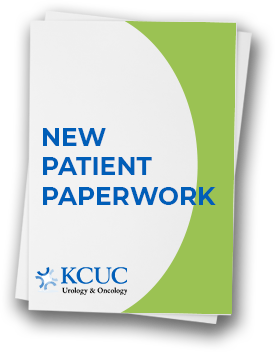Testicular cancer is a rare form of malignancy that develops in the testes, the male reproductive organs located in the scrotum. Testicular cancer occurs in about 1 in 300 men in their lifetime and typically affects men aged 15 to 35. When detected early, it can be treated successfully in over 95% of cases. Education and self-exams are the keys to discovering testes cancer early.
With over 20 experienced urologist and oncologist office locations in Kansas and Missouri, the doctors at KCUC proudly offer diagnosis and testicular cancer treatment in Kansas City, Overland Park, Emporia, Leavenworth, Merriam, Clinton, Lexington, Paola, Liberty, Olathe, Harrisonville, Lee’s Summit, Independence, MO, and the entire KC metro area.
Risk Factors
While the cause of testicular cancer is not known, the following conditions are associated with increased risk.
- Age — young men aged 15 to 35 are at the highest risk
- An undescended testicle, called cryptorchidism
- Klinefelter’s Syndrome, where an extra X chromosome results in failure of the testicles
- Family or personal history of testicular cancer
- Race — Caucasian men are at higher risk
Types of Testicular Cancer
Most (95%) testicular cancer originates in germ cells. These are cells that eventually mature into sperm. There are two main types of germ cell testicular cancer:
- Seminomas — tend to be less aggressive and are responsive to radiation therapy
- Non-seminomas — tend to grow and spread rapidly but are responsive to chemotherapy
A small percentage (5%) of testicular cancer develops in the stroma, the hormone-producing tissue of the testicles.
Symptoms
Men with testicular cancer usually have no symptoms except for finding a lump in a testicle, often found when performing a self-exam or during a doctor’s visit. Symptoms may include:
- Testicular swelling, hardness or pain
- Heavy or aching feeling in the scrotum or lower abdomen
- Pain is not always a sign of cancer but should still be evaluated
Diagnosis
Your doctor will first perform a history and physical exam that includes checking your testicles and abdomen for lumps, swelling, or enlarged lymph nodes. He may order an ultrasound, CT scan, chest X-ray, and blood tests to provide more information to make the diagnosis. Alpha-fetoprotein and HCG (human chorionic gonadotropin) are proteins that are sometimes produced in high volumes by testicular cancer. These are considered tumor markers and may be monitored through blood tests.
Biopsy — Although the diagnosis of testes cancer may be suspect based on exam and testes ultrasound, the true diagnosis requires testes biopsy. This biopsy is always performed on the testes after it has been removed to avoid tumor spread.
Stages
Staging requires pathological evaluation of the testes under the microscope, measuring serum tumor markers, and usually CT scan imaging. The staging is then assigned based on the extent and size of the tumor in the testes and whether metastasis is present. Testes cancer when it spreads is usually into lymph nodes first and later may include other organs like the lungs. A TNM (tumor, lymph nodes, metastasis) system is used for staging and treatment varies depending on these variables.
Contact KCUC today and choose the Kansas or Missouri location closest to you for any questions, diagnosis & treatment options for testicular cancer in Kansas City and the KC Metro.
Treatment of Testicular Cancer in Kansas City
When it comes to testicular cancer treatment in Kansas City, surgical removal of the testicle is usually performed immediately after the exam and ultrasound findings of a testicle suspicious for cancer. Delay is not advisable. While surgery to remove one testis should not affect fertility, some individuals elect to store their sperm in a sperm bank as a precaution. Both radiation and chemotherapy may cause temporary or permanent infertility.
Radical Inguinal Orchiectomy — the most common treatment is this outpatient procedure to remove the cancerous testicle and the attached spermatic cord. This may be a curative procedure when testes cancer is caught early and there is no other evidence of metastasis.
Retroperitoneal Lymph Node Dissection — if the cancer has spread to your lymph nodes or the diagnosis of the tumor is high grade or unfavorable, your doctor may perform this procedure to remove affected nodes. It requires an incision and general anesthesia. This procedure may be performed laparoscopically, using several small incisions.
External Beam Radiation Therapy — the most common treatment for patients diagnosed with seminoma cancer. High energy X-rays are precisely targeted to include the abdominal lymph nodes where testes cancer may first metastasize.
Chemotherapy — Since the mid-1970s Cis-Platinum based chemotherapy has been shown to be very effective for non-seminoma testes cancer. Depending on the cell type and staging after orchiectomy, systemic chemotherapy may be used as primary treatment or in combination with surgery and is administered by a medical oncologist.

